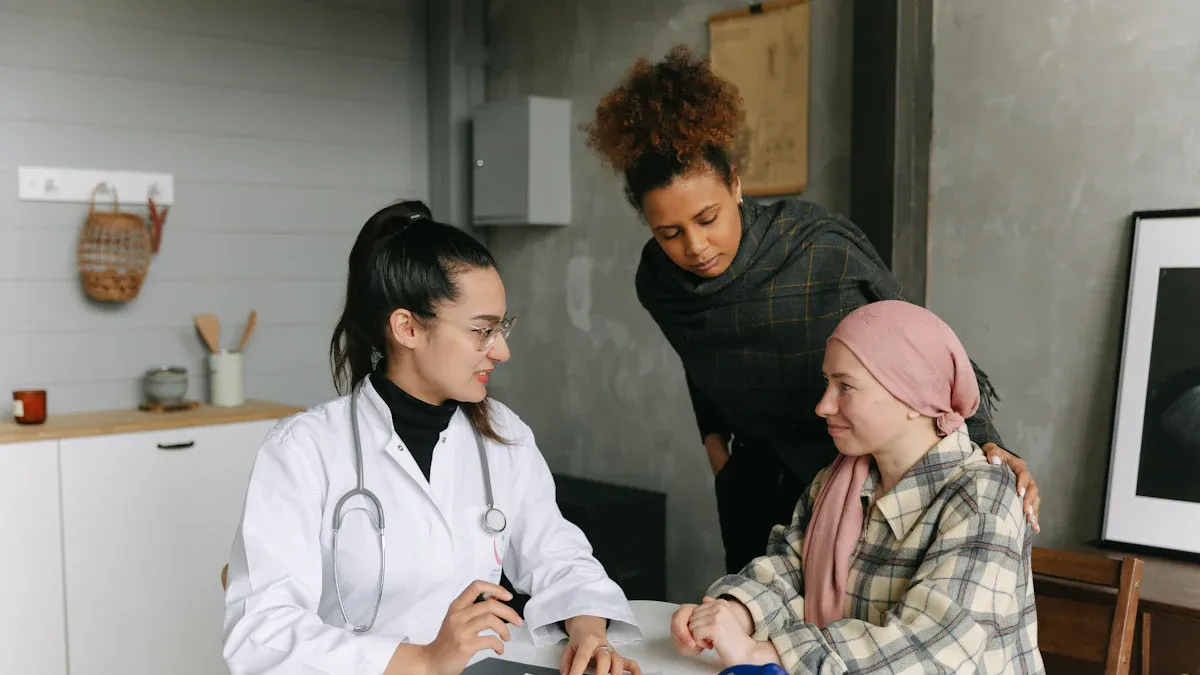5 Essential Steps to Take After a Cancer Diagnosis

A cancer diagnosis can feel overwhelming, shaking your sense of stability. You might experience fear, confusion, or even disbelief. These emotions are natural, but remember—you are not alone. Many people have walked this path and found strength to move forward.
Taking small, manageable steps can help you regain control. For example:
Early detection of breast cancer leads to survival rates higher than 90%.
For DCIS (ductal carcinoma in situ), survival rates reach up to 99%.
These numbers show that understanding your diagnosis and acting early can make a difference. The journey begins: understanding the cancer diagnosis process is your first step toward hope and healing.
Key Takeaways
Ask your doctor questions about your cancer. Knowing your type and stage helps you decide better.
Get information from trusted sources like doctors. Avoid unreliable websites to stay clear of confusion.
Share your diagnosis with family and friends for support. Their help can make you feel less stressed.
Think about getting a second opinion to confirm your diagnosis. This can help you feel sure about your treatment plan.
Take care of yourself by eating healthy and exercising lightly. These habits can make you feel better overall.
The Journey Begins: Understanding the Cancer Diagnosis Process
Ask Questions About Your Diagnosis
Clarify the type and stage of cancer.
Understanding your diagnosis is the first step toward taking control. Ask your doctor about the type of cancer you have and its stage. Each type and stage comes with unique challenges and treatment options. Knowing this information helps you make informed decisions about your care.
Understand the implications of your diagnosis.
Ask your healthcare provider what your diagnosis means for your health and daily life. Will you need immediate treatment? How might your condition progress? These questions can help you prepare for the road ahead. Write down the answers or ask a loved one to take notes during appointments.
Gather Accurate Information
Use reliable sources like medical professionals and trusted organizations.
Accurate information empowers you. Trusted sources, such as your doctor, the American Cancer Society, or the National Cancer Institute, provide reliable guidance. These organizations offer resources tailored to your specific diagnosis.
Avoid misinformation from unverified online sources.
Not all online content is trustworthy. Non-certified websites often spread misleading or harmful information. The table below highlights the difference between trusted sources and unreliable content:
Source Type | Reliability Level | Potential Risks |
|---|---|---|
Trusted Sources | High | Low risk of misinformation |
Non-Certified Content | Low | High risk of misleading or harmful info |
Stick to reliable sources to avoid unnecessary stress or confusion.
Keep a Record of Medical Details
Document test results, doctor’s notes, and treatment options.
Keeping a detailed record of your medical journey is essential. Use a notebook or digital app to track test results, treatment plans, and doctor’s recommendations. This record ensures you have all the information you need when discussing your care with your medical team or seeking a second opinion.
Build Your Support System

Lean on Loved Ones
Share your diagnosis with close family and friends.
Opening up to your loved ones can feel daunting, but sharing your diagnosis allows them to support you. Family and friends often want to help but may not know how unless you communicate your needs. Let them know what you’re going through and how they can assist. Whether it’s attending appointments with you or simply listening, their presence can make a difference.
Accept help with daily tasks and emotional support.
You don’t have to face this journey alone. Accepting help with daily responsibilities, like cooking or running errands, can ease your burden. Emotional support is equally vital. Studies show that strong social connections improve mental health, reduce anxiety, and enhance recovery rates.
Social support fosters a positive outlook, which is crucial for healing.
Patients with supportive networks report better quality of life and lower mortality rates.
Companionship and empathy from loved ones help you cope more effectively.
Connect with Advocacy Groups
Join cancer support groups for shared experiences.
Connecting with others who understand your journey can provide comfort and guidance. Support groups offer a safe space to share your feelings and learn from others’ experiences. Research highlights that joining these groups reduces anxiety and depression while increasing satisfaction with care.
Findings | Description |
|---|---|
Reduction in Anxiety | Support groups significantly lower anxiety levels in newly diagnosed patients. |
Increase in Satisfaction | Patients report higher satisfaction with their care and communication. |
Clinical Practice Implications | Expanding nurse navigator roles improves cancer care outcomes. |
Seek guidance from patient advocacy organizations.
Advocacy organizations can connect you with resources, financial assistance, and expert advice. They also provide educational materials tailored to your diagnosis. These groups empower you to make informed decisions and navigate your treatment with confidence.
Consider Professional Counseling
Work with a therapist to process emotions.
Cancer can bring a whirlwind of emotions. A therapist can help you process feelings like fear, anger, or sadness. Counseling provides tools to manage stress and build resilience. Studies show that therapy reduces anxiety and depression, improving overall well-being.

Explore group therapy options for additional support.
Group therapy combines professional guidance with peer support. Sharing your journey with others facing similar challenges fosters a sense of belonging. It also helps you gain new perspectives and coping strategies. Many patients find group therapy to be a powerful complement to individual counseling.
Seek a Second Opinion
Why a Second Opinion Matters
Confirm your diagnosis and treatment options.
Seeking a second opinion can provide clarity and reassurance. It allows you to confirm your diagnosis and explore alternative treatment options. Many patients find that a second opinion highlights new possibilities or validates their current care plan. In fact:
92% of patients who sought a second opinion reported they would follow the recommendations provided.
67% of second opinions revealed changes in the diagnosis or treatment plan.
These statistics show how valuable a second opinion can be in ensuring you receive the most accurate and effective care.
Gain confidence in your care plan.
A second opinion can also boost your confidence. When you understand your options and feel assured about your treatment plan, you can approach your journey with greater peace of mind. Improved clarity often leads to better decision-making and a stronger sense of control over your health.
Find Specialists and Multidisciplinary Teams
Look for oncologists with expertise in your cancer type.
Not all oncologists specialize in every type of cancer. Finding a specialist with experience in your specific diagnosis ensures you receive tailored advice. These experts stay updated on the latest research and treatments, offering you the best possible care.
Explore cancer centers with comprehensive care teams.
Cancer centers often provide access to multidisciplinary teams. These teams include oncologists, surgeons, nutritionists, and mental health professionals who collaborate to create a holistic treatment plan. Their combined expertise ensures that every aspect of your care is addressed.
Prepare for Your Second Opinion Appointment
Bring medical records and a list of questions.
Preparation is key to making the most of your second opinion appointment. Bring all relevant medical records, including test results and treatment plans. A list of questions can help you stay focused and ensure you address all your concerns. Patients who prepare thoroughly often feel more empowered during their appointments.
Metric | Value |
|---|---|
Success rate of patients implementing recommendations | 92% |
Percentage of second opinions revealing a diagnosis or treatment change | 67% |
Be open to alternative perspectives on treatment.
A second opinion may introduce new ideas or approaches. Stay open-minded and consider these perspectives carefully. Even if the recommendations differ from your initial plan, they could provide valuable insights or options you hadn’t considered.
Taking this step can transform your outlook. It reinforces your role as an active participant in your care and strengthens your ability to navigate "The Journey Begins: Understanding the Cancer Diagnosis Process."
Focus on Self-Care

Prioritize Physical Health
Maintain a balanced diet and stay hydrated.
Your body needs proper nourishment to support your treatment and recovery. A balanced diet rich in fruits, vegetables, lean proteins, and whole grains can boost your energy and immune system. Staying hydrated is equally important. Water helps your body flush out toxins and maintain essential functions. Research shows that prioritizing nutrition and hydration improves survival rates and quality of life for cancer survivors.
Evidence Type | Findings |
|---|---|
Diet and Nutrition | Proper nutrition and hydration correlate with better survival outcomes. |
Physical Activity | Regular exercise improves survival rates and quality of life. |
Research Gaps | More studies are needed across different cancer types. |
Engage in light exercise as recommended by your doctor.
Physical activity, even in small amounts, can make a big difference. Light exercises like walking or yoga improve circulation, reduce fatigue, and enhance your mood. Always consult your doctor before starting any exercise routine. They can guide you on what’s safe and beneficial for your condition.
Address Emotional and Mental Well-Being
Practice mindfulness or meditation to reduce stress.
Mindfulness practices, such as meditation or deep breathing, can help you manage stress and anxiety. Just five minutes of mindful breathing three times a day has been shown to significantly reduce stress levels. Studies also highlight that mindfulness improves sleep quality and emotional resilience.
Mindfulness reduces depression symptoms in cancer survivors.
It promotes tranquility and boosts self-esteem.
Regular practice helps you cope with emotional challenges.
Seek emotional outlets like journaling or creative activities.
Expressing your feelings can be therapeutic. Journaling allows you to process emotions and track your progress. Creative activities like painting, music, or crafting provide a positive outlet for stress. These activities not only distract you from worries but also bring joy and a sense of accomplishment.
Set Boundaries and Manage Stress
Limit exposure to overwhelming situations or people.
Protecting your mental health is crucial. Avoid situations or individuals that drain your energy or add unnecessary stress. Setting boundaries helps you focus on what truly matters—your well-being. Politely decline commitments that feel overwhelming and prioritize your needs.
Focus on activities that bring you joy and relaxation.
Engage in hobbies or pastimes that make you happy. Whether it’s reading, gardening, or spending time with loved ones, these moments of joy can uplift your spirit. Relaxation techniques like listening to calming music or taking a warm bath can also help you unwind.
Intervention Type | Outcomes |
|---|---|
Fewer emergency visits, shorter hospital stays. | |
Cognitive Behavioral Therapy | Improved emotional well-being and relaxation techniques. |
Psychosocial Education | Reduced anxiety and enhanced quality of life. |
Taking care of yourself physically and emotionally is not just important—it’s essential. These small steps can empower you to face each day with strength and positivity.
Create a Treatment Plan
Collaborate with Your Medical Team
Discuss treatment options, including risks and benefits.
Your medical team is your greatest ally in this journey. Discuss all available treatment options with them. Ask about the potential risks and benefits of each choice. Understanding these details helps you make decisions that align with your goals and values. Treatments like surgery, chemotherapy, or radiation may feel overwhelming, but knowing what to expect can ease your concerns.
A collaborative approach to care can transform your experience. Studies show that patients who actively engage with their healthcare team experience better emotional, physical, and functional well-being. Regular assessments and tailored interventions improve outcomes and ensure you receive the care you need.
Ask about clinical trials or alternative therapies.
Clinical trials often provide access to cutting-edge treatments. Ask your doctor if you qualify for any trials related to your diagnosis. These trials can offer innovative therapies that may not yet be widely available. Additionally, inquire about alternative therapies that could complement your treatment plan. Options like acupuncture or nutritional counseling may enhance your quality of life.
Develop a Personalized Roadmap
Set realistic goals and timelines for treatment.
Creating a personalized roadmap gives you a clear path forward. Work with your medical team to set achievable goals and timelines for your treatment. Break the process into smaller steps to make it more manageable. This approach helps you stay focused and motivated throughout your journey.
Plan for follow-up care and monitoring.
Your treatment doesn’t end after the initial phase. Follow-up care and regular monitoring are essential for long-term success. Schedule check-ups and tests to track your progress. These appointments ensure that any changes in your condition are addressed promptly.
Outcome | Result |
|---|---|
Reduction in anxiety | Significant |
Reduction in depression | Significant |
Increase in satisfaction | Significant increase in cancer-related care and communication |
Clinical practice implications | Evidence-based interventions to improve cancer care outcomes |
Stay Informed and Flexible
Be prepared to adjust your plan as needed.
Flexibility is key to navigating your treatment journey. Your needs may change over time, and your plan should adapt accordingly. Stay open to adjustments based on your progress or new developments in your care. This adaptability ensures you remain on the best path forward.
Keep communication open with your healthcare providers.
Strong communication with your medical team is vital. Share any concerns or changes in your condition promptly. Regular updates help your providers tailor your care to meet your evolving needs. Open dialogue fosters trust and ensures you feel supported every step of the way.
By collaborating with your team, setting clear goals, and staying flexible, you can create a treatment plan that empowers you to face this challenge with confidence and hope.
You have the power to take control of your journey. By understanding your diagnosis, building a support system, seeking a second opinion, focusing on self-care, and creating a treatment plan, you can face this challenge with confidence.
Professional guidance, regular physical activity, and a balanced diet can improve survival rates and enhance your quality of life. Following Cancer Prevention Recommendations may also protect you from other health complications.
You are not alone. Explore resources like the American Cancer Society or patient advocacy groups for support and education. Each step forward brings you closer to healing and hope.
FAQ
What should you do if you feel overwhelmed after a cancer diagnosis?
Take a deep breath and focus on one step at a time. Reach out to loved ones or a counselor for emotional support. Remember, you don’t have to face this alone. Many resources and support groups are available to guide you through this journey.
💡 Tip: Journaling your feelings can help you process emotions and reduce stress.
How can you find reliable information about your diagnosis?
Stick to trusted sources like your doctor, the American Cancer Society, or the National Cancer Institute. Avoid unverified websites or forums. Reliable information empowers you to make informed decisions about your care and treatment options.
Source | Reliability |
|---|---|
Medical Professionals | High |
Certified Organizations | High |
Unverified Online Sources | Low |
Is it normal to seek a second opinion?
Absolutely! Seeking a second opinion is a proactive step. It helps confirm your diagnosis and explore additional treatment options. Many patients feel more confident and informed after consulting another specialist. This ensures you’re receiving the best possible care for your condition.
How can you manage stress during treatment?
Incorporate mindfulness practices like meditation or deep breathing into your daily routine. Engage in activities that bring you joy, such as reading or spending time with loved ones. Setting boundaries and prioritizing self-care can also help you maintain emotional balance.
🧘 Note: Even five minutes of mindfulness daily can significantly reduce stress.
What role does nutrition play in your recovery?
Nutrition plays a vital role in supporting your body during treatment. A balanced diet with fruits, vegetables, lean proteins, and whole grains boosts energy and strengthens your immune system. Staying hydrated is equally important for maintaining overall health and aiding recovery.
🍎 Tip: Consult a nutritionist to create a meal plan tailored to your needs.
See Also
An In-Depth Overview of Various Cancer Types
Understanding Cervical Cancer: Symptoms You Should Know
Identifying Symptoms Associated with Kidney Cancer
Exploring Symptoms and Treatment Options for Conjunctival Melanoma
Recognizing Symptoms and Treatment Approaches for Duodenal Cancer

